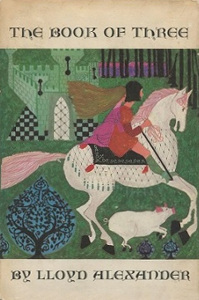The Book of Three

Author:
Lloyd Alexander
Cover Artist:
Evaline Ness
Publication:
1964 by Holt, Rinehart and Winston
Series:
The Chronicles of Prydain
Series Number: 1
Pages:
217
Current state:
Basic information has been added for this book.
It has been read but content considerations may not be complete.
Book Guide
Search for this book used on:
Blending rich elements of Welsh legend and universal mythology, Lloyd Alexander creates the imaginary kingdom of Prydain to tell a tale of enchantment, both good and evil, and of the Assistant Pig-Keeper who wants to become a hero.
In an enthralling chronicle, Taran, Assistant Pig-Keeper to a famous oracular sow, sets out on a hazardous mission to save Prydain from the forces of evil. He meets adventures in which humor and high valor are blended in a way that will keep readers of many ages completely absorbed—for this is fantasy that is rooted in reality and truth.
For, as Mr. Alexander says in his introductory note: "Most of us are called on to perform tasks far beyond what we believe we can do. Our capabilities seldom match our aspirations, and we are often woefully unprepared. To this extent, we are all Assistant Pig-Keepers at heart."
From the dust jacket
To view an example page please sign in.
To view awards and booklists please sign in.
Reviews

The Book of Three by Lloyd Alexander
Reviewed by Sherry Early
I love Lloyd Alexander’s quirky, idiosyncratic characters:
Taran, Assistant Pig-Keeper, is the immature, rash, and bumbling sort-of-hero of the story. Well, if not the hero, at least he’s the main character, and he’s about to go on an epic hero’s journey, even if he is only an Assistant Pig-Keeper. And more . . .

The Chronicles of Prydain: The Book of Three
Reviewed by Sara Masarik
The first chapter is hard. It’s not hard to read. It’s not hard to understand. It’s a little bit unfamiliar, but not terribly so if you have any affection for Arthurian Legend. It’s just sort of dull. And, of course, that’s the point. It is supposed to be equal parts dull and equal parts disorienting. Whether or not it was a wise choice on the part of the author to start so slowly is almost irrelevant. The reality is that as soon as the pig runs away, the adventure is underway.
Find This Book
Search for this book used on:


